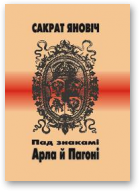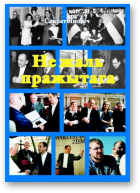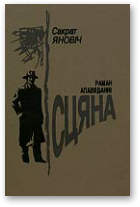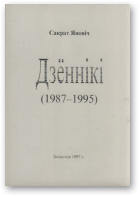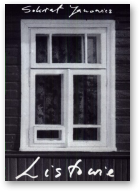- Home Page
- What’s New
- Books
- Audiobooks
- Periodicals
- Radio auditions
- Music
- Video
- Plans
- BHA’s Catalog
- EEDC’s Catalog
- Shop
- Skaryna’s Catalog
- MiOKB’s Catalog
- Private Catalog
- Belarusian Authors
- Belarusian publishers
- Publishing series
- Belarusan Emigration Collections
- Aphorisms
- Our banners
- About Us
- Partners
- Search/ Catalog
- News Archive

|

|
Не пашанцавала
Камедыя ў трох адслонах
Яновіч Сакрат
Publication Place: Беласток
Publication Date: 1978
Publisher: Ваяводская ўправа
Sizes: 46 с., 21 см
Category: Belles-Lettres
Copyright © 1978 by Сакрат Яновіч
Book Collection: KAMUNIKAT — this site (online version); MiOKB — the library of the Belarusian Culture Community and Museum, ul. 3 Maja 42, Hajnówka (hardcopy)
Copy Numbers: MiOKB — [1796], [3626]
Нарадзіўся С. Яновіч у сям'і шаўца, Канстанціпа Яновіча, які меў таксама трохгектарпую гаспадарку. У школе спрабаваў пісаць вершы па-польску і па-руску. У 1950 г. адправіўся з Крыпак у "вялікі горад Беласток", дзе скончыў электратэхпікум (1955) і затым (завочна) аддзяленне беларускай філалогіі Настаўніцкага інстытута (1962). Працаваў журналістам у штотыднёвіку "Ніва", кіраваў аддзелам галоўнага праўлення Беларускага грамадска-культурнага таварыства. У 1973 г. завочна скончыў факультэт польскай філалогіі Варшаўскага універсітэта. Пратэстуючы супраць бюракратызацыі ўлады, быў вымушаны пайсці на "чорную работу" — рабіў кладаўшчыком, тэхнікам бяспекі працы, што ўзбагаціла яго жыццёвымі назіранпямі. Быў старшынёй Клуба Саюза польскіх пісьмепнікаў у Беластоку (1976-1981). У апошнія гады ўсё больш займаецца палітычнай дзейнасцю, змагаецца за роўныя правы беларусаў Беласточчыны з палякамі. Адзін з заснавалыіікаў Беларускага незалежнага выдавецтва (1981-1987). Старшыня партыі Беларускаедэмакратычнае аб'яднапне (з 1990). Жыве ў мяст. Крынкі Беластоцкага ваяв. Яго дом (т. зв. Villa Sokrates) стаў беларускім культурным асяродкам. Тут атрымала бясплатна памяшканне рэдакцыя штомесячніка "Czasopis".
Belarusian Authors: Яновіч Сакрат
Catalog: Kamunikat.org | MiOKB
Worth reading:
Мініяцюры
Яновіч Сакрат
Miniatures are one of the hallmarks of Sokrat Janowicz's work. These short texts, even though written in prose, because of their lyricism, emotionality and the extraordinary language harmony are on the border of poetry. In a condensed form, the writer talks about the vanishing world of the Belarussian countryside, spiritual motherland, loss and duty of remembrance, using the speech which he calls his religion. Thus he enchants them, as ... More »
Хатняе стагоддзе
Яновіч Сакрат
The Domestic Century is a book of reflections and a timeline. Sakrat Yanovich, as he himself admitted, writes carefully polishing every word and every sentence to make sure that even a short expression carries a full spectrum of images, feelings and ideas. He does not waste words or create extensive and long descriptions of some occurrences. He uses few, carefully selected and polished words to fully express what is on his mind, but h... More »
Пад знакамі Арла й Пагоні
Яновіч Сакрат
Under the Eagle and Chaser Symbols is a research paper. Sakrat Yanovich stresses that Belarusian culture emerged in the Grand Duchy of Litva and shaped later in Rzeczpospolita. He questions the assertion that the Belarusian people are a small brother in the Slavic community. Russia and Russian culture had little influence on the formation of the ethnos and culture of the Belarusians. The ethnos shaped under the influence of Polish and E... More »
Не жаль пражытага
Яновіч Сакрат
Nothing to Regret Sakrat Yanovich In Nothing to Regret Sakrat Yanovich reflects on his past. At times it is easier to lay bare one's heart before a stranger than tell loved ones about a small incident. Sakrat Yanovich had courage (which is rare) to tell the world about his life, 50 years of creative work. Although he may not be happy with all he did, he does not blame himself and does not regret about his life. Every one of us liv... More »
Дзённікі
(1995 – 2000)
Яновіч Сакрат
Almost everyone writes diaries. Everyone at least once in his or her life takes note of his thoughts, feelings and reflections. Girls especially like to write down and share their secrets. The “kids’ fun” usually passes together with childhood and adolescence. Sakrat Yanovich’s diaries are a timeline of events, a timeline of life seen through the prism of the author’s outlook. The author took down his observations, reflections, compar... More »
Запісы веку
Яновіч Сакрат
Як толькі перастаў я поўзаць малечаю па хаце i пачаў хадзіць, памятаю акно. Яно вабіла мяне святлом i таемнымі гукамі. Даставаўся я да яго з бядою, але неадступна. Ужо прадчуваў i нават разумеў, што свет не канчаецца ў сенях, i аднекуль заходзяць да нас людзі, цёткі з дарункамі цукеркаў. Мне вельмі хацелася ўбачыць — менавіта — адкуль яны i як; a яшчэ, якія ў ix хаты, бо чуў, што таксама маюць свае... Акно снілася. Тады я вылятаў цераз ... More »
Сцяна
Раман. Апавяданні
Яновіч Сакрат
The book includes Sakrat Yanovich’s novel The Wall, as well as his stories. A Belarusian writer who was born and lives in Poland’s Bialystok area, Yanovich is well-known for his stories. In this book, he tries himself as novelist. His main character Sumlenevich is a man who believes in a victory of good over evil. The author, whose life was quite tough, full of evil and lawlessness, shows how difficult it is to believe in truth an... More »
Дзённікі
(1987-1995)
Яновіч Сакрат
Як празаік С. Яновіч дэбютаваў у 1956 г. на старонках беларускага штотыднёвіка „Ніва”. Аўтар зборніка апавяданняўі мініяцюр „Загоны” (Беласток, 1969), аповесціпра К. Каліноўскага „Сярэбраны яздок” (Мн., 1978), кніг „Думкі пра аўтаномію” (Беласток, 1981), „Праваслаўная царква ў Беластоцкім краі і беларуская мова ў ім” (Нью-Йорк, 1984), „Самасей” (Мн., 1992), „Доўгая сьмерць Крынак” (Беласток; Бельск, 1993), „Лістоўе — лістове” (Беласток,... More »
Лістоўе Listowie
Яновіч Сакрат
Я свечкі запаліў, у пакоі цішыня велікодная. Бачу Бацьку... Крынкі халаднаногія! Іду ў даліну пачатку свайго — готыка дзяцінства на небакраі. На вашых выганах бесклапотнасці і ў вішнях радасці рэха загуляла са мною ў схованкі. Чырванею, засаромлены сталасцю. Крынкі вячэрнезвонныя! Кіра-пані хараством візантыйскім сваім не асудзіла мяне на будзённасць. More »
Доўгая смерць Крынак
Апавяданьні, аповесьць
Яновіч Сакрат
In his book Krynki’s Slow Extinction the author predicts the extinction of his native village, its apocalypses. The village of Krynki near the Polish-Belarusian border has a long and complex history. It was inhabited by ethnic Belarusians, Poles, Jews and Tatars. All Jews have left leaving an old synagogue and memories behind. Memories die together with its senior inhabitants who lived there at the time. Few babies are born in Krynki ... More »







